International Opportunities and the positives from BREXIT
Back in June 2016 when the Brexit Referendum results were announced, it seemed that the World had fallen in on us in Ireland.
Yes the seamless / frictionless / no hassle trade with our nearest neighbour and biggest trading partner was coming to an end, and there would be major issues using the UK land border to transport goods to the rest of the EU etc., and of course the major issue of a hard border on the island of Ireland.
Notwithstanding the considerable logistical changes and difficulties associated with Brexit, we are now beginning to see the massive opportunities it has given us:
- As the only English Speaking country in the EU there are considerable opportunities for further FDI
- We can go for more and more IFI (International Financial Institutions) Public Procurement funded projects in emerging nations - Tenders are issued in English - Consulting Ireland can support businesses here.
- More and more International Trade Opportunities will emerge though these and our local partners
- Financial Services ;and other Industries businesses will move their base here given that we are English speaking , EU member with a highly educated work force
Seamus McCann provides his views on the potential opportunities available to Irish businesses following BREXIT.
Irish Businesses are constantly being encouraged to look for opportunities beyond these shores and outside our traditional markets such as the UK, US and Western Europe. The recent decision by our nearest neighbour to withdraw from the European experiment has focussed minds on the need for a speedier and more expansive market diversification.
Yet Ireland has continued to ignore significant €multi-billion opportunities in the developing countries where payment is secure and advances of up to 60% are not uncommon.
Untapped Markets
The markets we refer to are those funded by the major International Financing Institutions (IFIs - e.g. EC, United Nations, World Bank etc.). The numerous opportunities - over 200,000 daily service and supply tenders across all sectors - are being aggressively and successfully pursued by both private and public sector organisations from many of our EC partner countries.
Projects funded by the likes of the EC and World Bank are often a prelude to other private ‘downstream’ business opportunities in these markets and as such help to promote a more strategic market-entry approach and provide key business intelligence to these increasingly important emerging markets.
From a very-respected position some three decades ago, Ireland’s position continues to plummet where we are now the lowest-ranked member among the initial EC12 and currently in 24th position in the EC28 activity table. The advent of the ‘Celtic Tiger’ only helped to hasten this dis-engagement process from these key markets, conservatively estimated at over €1trillion per annum.
While Ireland had the EC Commissioner for Agriculture and Rural Development until 2021, not one Irish Agri/Food firm is pre-selected in the EC top 60 Agri/Food firms providing little in the way of policy, strategy and advice to these international markets.
The UK on the other-hand is currently the most active and successful country at winning EC Funded work due in part to the support given by Government through its Foreign Embassies, State Agencies and a focussed International Aid programme that recognises the importance of trade. This is further enhanced by the fact that English is the language of choice for most of these global tenders.
The Positives of BREXIT
With BREXIT, the future selection for any EC-Funded business is likely to only include organisations from the remaining 27 Member States. In our ConsultingIreland review we are able to identify well over 4,000 UK entities who will no longer be eligible to participate directly in these EC-funded projects. Ireland will then be the main English-speaking member and should be well positioned to capitalise on the British exit and enable our firms to replace a number of the existing UK market participants.
While many Irish organisations shy away from this work believing it to be too bureaucratic, the fact is that the bidding process and procedure are always the same no matter whether the opportunity is in Brazil, Mauritius, Washington or Fiji.
My own SME company has worked in these markets for close on 30 years and in over 100 countries, but rather than being concerned by the country of delivery we view our client as the EC or World Bank. Tenders are available on a daily basis and Ireland’s expertise and experience is certainly relevant and required and, from a cash-flow perspective, the major IFIs always pay fairly promptly.
‘Best Practice’
By way of comparison, Denmark is now winning 10 times the IFI-funded business than that of Ireland and figures published by independent sources show a majority of the newer EC Member States are more engaged with the major IFIs and these external markets. Even Albania, a non-EC Member State, is much more active and their SMEs more engaged.
Elsewhere many of our more established European partners in e.g. France, Germany etc. are engaging highly trained Irish experts for international IFI assignments – in part because of their English language proficiency. The fact that the successful companies are primarily SMEs, leaves little doubt that Ireland has missed - and continues to miss - major business opportunities.
Fig. 1 below shows that our other European partners have no such hesitation in engaging with the IFIs.
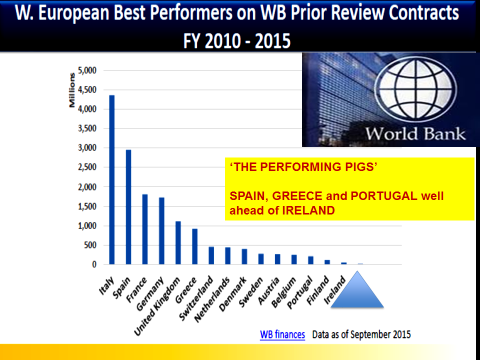
FIG. 1 WORLD BANK ACTIVITY FOR WESTERN EUROPEAN COMPANIES
Need for a Trade Focus
The Irish Government and its Agencies tend to focus on the less commercial elements of the IFI and emerging market opportunities. Significant effort in manpower and financial support is given by the Government and its Agencies to EC R&D programmes such as Horizon 2020. But these programmes account for less than 8% of EC funds and are primarily the target of selected Universities, Multinationals and specialist research bodies. One has to wonder why Ireland is prepared to promote engagement in H2020 but not the more-commercial tenders, even though the Funder is the same.
Government’s other international focus is on the NGO/Aid market, providing support to the developing markets. However what these markets want and need is ‘Better Aid more Trade’. Going forward it is important that Ireland’s trade approach is less NGO-led and more commercially focussed, mirroring that of the more successful countries.
The success of other nations and EC partner countries is due to the fact they are able to multi-task/multi-focus and benefit from the existing synergies in these various markets while prioritising the commercial element of their involvement. Ireland lacks that ‘connectivity’ between the key parties – Government, Embassies, State Agencies, NGOs, Business Associations and Commercials.
Government Engagement Needed
Our analysis indicate that Government support is a key element in the overall success of such an undertaking. The benefits of better ‘connectivity’ is demonstrated by the success of Hungary where the Government provides strong administrative and financial support to its companies and over the last year they have recorded some extremely positive results for their members.
This structured approach working with the IFIs should be a ‘first-step’ and can be part of an organisations overall strategy for expansion into new markets, resulting in greater profitability and ensuring less reliance on the domestic marketplace.
If Ireland can embrace these markets, then Irish expertise and products will reach to a greater number of countries and that in turn will help us to start to climb back up the IFI activity table from our lowly 24th position.
| CONSULTINGIRELAND SUPPORT
As a Business Association focussed on these IFI funded markets, ConsultingIreland has been established to help Irish organisations and companies win an increased share of these more commercial IFI opportunities. To that end we have reviewed the ‘best practice’ from other successful nations to facilitate a successful entry into these new markets. Our Association provides the following support to organisations interested in these markets by;
|
Seamus McCann is the current Chairman of ConsultingIreland. He has over 30 years’ experience working with the major international funders such as the EC and World Bank. ConsultingIreland is an initiative to help Irish organisations win a greater share of this funded business. Seamus is an accountant and has previously worked in various State organisation such as ESB, Eircom and Teagasc.
Other CI Articles on Brexit
- Review of Brexit being undertaken by ConsultingIreland
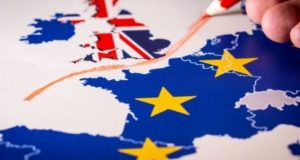 ConsultingIreland is now reviewing the implications of Brexit in relation to IFI markets. The recent vote has resulted in a number of queries from UK in relation to the implications on business with the European Commission and the possibility of relocating to a member state. A number of Irish companies (North and South) have also been in ...
ConsultingIreland is now reviewing the implications of Brexit in relation to IFI markets. The recent vote has resulted in a number of queries from UK in relation to the implications on business with the European Commission and the possibility of relocating to a member state. A number of Irish companies (North and South) have also been in ... - ConsultingIreland on International Opportunities and BREXIT @Enniscorthy, Ireland
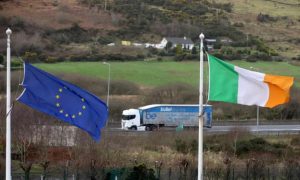 ConsultingIreland offered a conference on International Opportunities and BREXIT at the Enniscorthy Enterprise Centre in February 2017. Seamus McCann introduced the attendants to the 1 trillion euro international market that any company can access through Public Procurement Tendering by working for International Financial Institutions such as the World Bank and the European Commission. A great emphasis ...
ConsultingIreland offered a conference on International Opportunities and BREXIT at the Enniscorthy Enterprise Centre in February 2017. Seamus McCann introduced the attendants to the 1 trillion euro international market that any company can access through Public Procurement Tendering by working for International Financial Institutions such as the World Bank and the European Commission. A great emphasis ... - The Brexit Opportunity for South-Easth Region Exporters
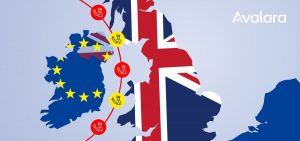 This event hosted by ConsultingIreland presents the established Irish bidding teams we have to target international markets. These teams are formed around industry clusters such as agriculture, energy and finance. The opportunity exists to create such clusters based in Wexford and the South East region of Ireland.
This event hosted by ConsultingIreland presents the established Irish bidding teams we have to target international markets. These teams are formed around industry clusters such as agriculture, energy and finance. The opportunity exists to create such clusters based in Wexford and the South East region of Ireland. - Article by ConsultingIreland: International Opportunities and the positivies from Brexit
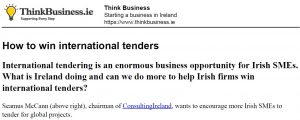 Irish Businesses are constantly being encouraged to look for opportunities beyond these shores and outside our traditional markets such as the UK, US and Western Europe. The recent decision by our nearest neighbour to withdraw from the European experiment has focussed minds on the need for a speedier and more expansive market diversification. Yet Ireland has ...
Irish Businesses are constantly being encouraged to look for opportunities beyond these shores and outside our traditional markets such as the UK, US and Western Europe. The recent decision by our nearest neighbour to withdraw from the European experiment has focussed minds on the need for a speedier and more expansive market diversification. Yet Ireland has ...
